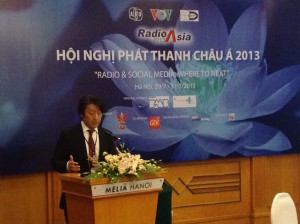Media companies need to put people’s lives before ratings and profits when responding to emergencies.
That call was made by Filipino broadcaster Louie Tabing at the second Radio Asia workshop in Hanoi, Vietnam on Monday.
Tabing, who works with Radio DZMM in Manila, said the Philippines was the most disaster prone country in the world. As well having its fair share of natural disasters, man-made tragedies caused by poverty, poor infrastructure and overloaded public transport leads to thousands of unnecessary deaths.
While many broadcasters responded well to these emergencies, most did so for ratings and revenue opportunities – whereas the chance to educate the public were missed, he said.
Tabing complained that very few media companies in the Philippines were willing to participate in meaningful disaster mitigation.
He told Radio Asia delegates that one company ABS-CBN had a 25 strong team, permanently on standby to respond to emergencies, complete with their own fire engine and boats.
Meanwhile the Philippines Foundation for Rural Broadcasters is creating a document for emergency preparedness to help community stations advise the public following disasters.
Many delegates noted that emergency preparedness was woeful in many Asian countries, but that Japan leads the way.
Famous for their readiness to respond to earthquakes, Japanese seismologists can now interrupt radio and TV programming to warn of an impending quake, said Takanobu Tanaka, a senior media researcher with broadcaster NHK.
Automated messages can be broadcast when smaller seismic activity is initially picked up. Often these signals warn that a major quake is imminent.
The instantaneous messaging system, together with the rapid response of broadcasting teams has saved many lives over the years and kept the Japanese public informed about disasters.

